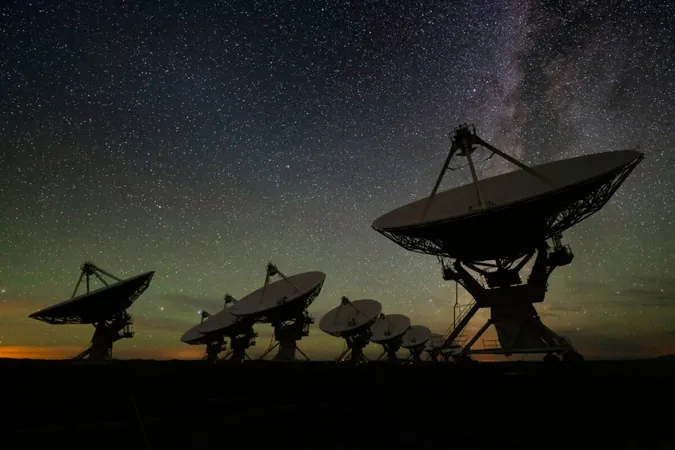
Dark Energy: A Surprising Key to the Search for Extraterrestrial Life!
2024-11-23
Author: Mei
Introduction
In the 1960s, visionary radio astronomer Frank Drake introduced his famed equation to grapple with the tantalizing question: Are we alone in the universe? His formula delves into the probability of finding extraterrestrial life — particularly the life forms detectable via radio waves. A crucial element of the equation is the star formation rate; the more stars we have, the higher the chance of planets capable of harboring life.
The Importance of Star Formation Rate
For decades, astronomers have meticulously charted the star formation history of the universe, tracking how much matter gets sculpted into stars across different cosmic eras. Understanding the star formation rate is vital since it reacts sensitively to numerous cosmological factors. Alter anything about the universe's makeup, and you end up with different outcomes regarding galaxy formation and star birth efficiencies.
The Peak Star Formation Rate
Remarkably, the universe saw its peak star formation rate over 10 billion years ago. While stars have continued to form since then, their production has continually diminished. Scientists predict that in about 100 trillion years, the final stars will flicker out. One of the most significant culprits behind this extended timeline is dark energy — the enigmatic force propelling the universe's acceleration.
Impact of Dark Energy on Star Formation
However, this accelerated expansion poses a dire threat to star formation. With galaxies drifting apart, opportunities for interaction dwindle, limiting the inflow of new material necessary for star creation. Consequently, existing gas gets trapped in warm interstellar clouds, failing to contribute to the cosmic star-making process.
Alternative Scenarios with Dark Energy
But what if dark energy operated differently? Would it radically alter star formation, and consequently, the chances of life emerging? Is our universe’s dark energy level—a staggering 70% of its total energy—common or anomalous?
Research Study on Dark Energy
A groundbreaking study led by Daniele Sorini at Durham University’s Institute for Computational Cosmology sought to address these questions. "Understanding dark energy and its implications for our universe is one of the greatest challenges in cosmology and fundamental physics," Sorini emphasized. The researchers uncovered unexpected results: regardless of dark energy being significantly higher than current measurements, the rate of star formation remained fairly consistent.
Surprising Findings and Implications
"Surprisingly, even with a much greater dark energy density, life could still emerge. This suggests we might not reside in the most probable universe," Sorini stated. Current estimates indicate that only about 23% of cosmic mass will eventually convert into stars. While weaker forms of dark energy could enhance star formation efficiency to a mere 27%, models indicate that values a hundred times greater than our observed dark energy would still yield a remarkable 5% conversion rate—sufficient for countless star generations and ample planetary material for life.
The Multiverse Perspective
If we entertain the notion of a multiverse, where each universe randomly inherits its dark energy value, then our universe’s specific dark energy might be quite eccentric. Most intelligent observers—assuming any universe produces enough stars to foster life—would likely inhabit realms with substantially higher dark energy levels.
Conclusion and Future Research
This research raises fascinating questions about our universe’s uniqueness and dark energy's role in life’s existence. Professor Lucas Lombriser of the University of Geneva and co-author of the study stated, "We are eager to use this model to investigate the potential for life across various universes, prompting us to reconsider fundamental questions about our own cosmos."
As we dive deeper into understanding dark energy's mysterious influence, we inch closer to unraveling the cosmic puzzle of life beyond our planet! Are we truly living in a universe with an improbable dark energy value? Stay tuned as we explore more revelations from the far reaches of the universe!



 Brasil (PT)
Brasil (PT)
 Canada (EN)
Canada (EN)
 Chile (ES)
Chile (ES)
 España (ES)
España (ES)
 France (FR)
France (FR)
 Hong Kong (EN)
Hong Kong (EN)
 Italia (IT)
Italia (IT)
 日本 (JA)
日本 (JA)
 Magyarország (HU)
Magyarország (HU)
 Norge (NO)
Norge (NO)
 Polska (PL)
Polska (PL)
 Schweiz (DE)
Schweiz (DE)
 Singapore (EN)
Singapore (EN)
 Sverige (SV)
Sverige (SV)
 Suomi (FI)
Suomi (FI)
 Türkiye (TR)
Türkiye (TR)